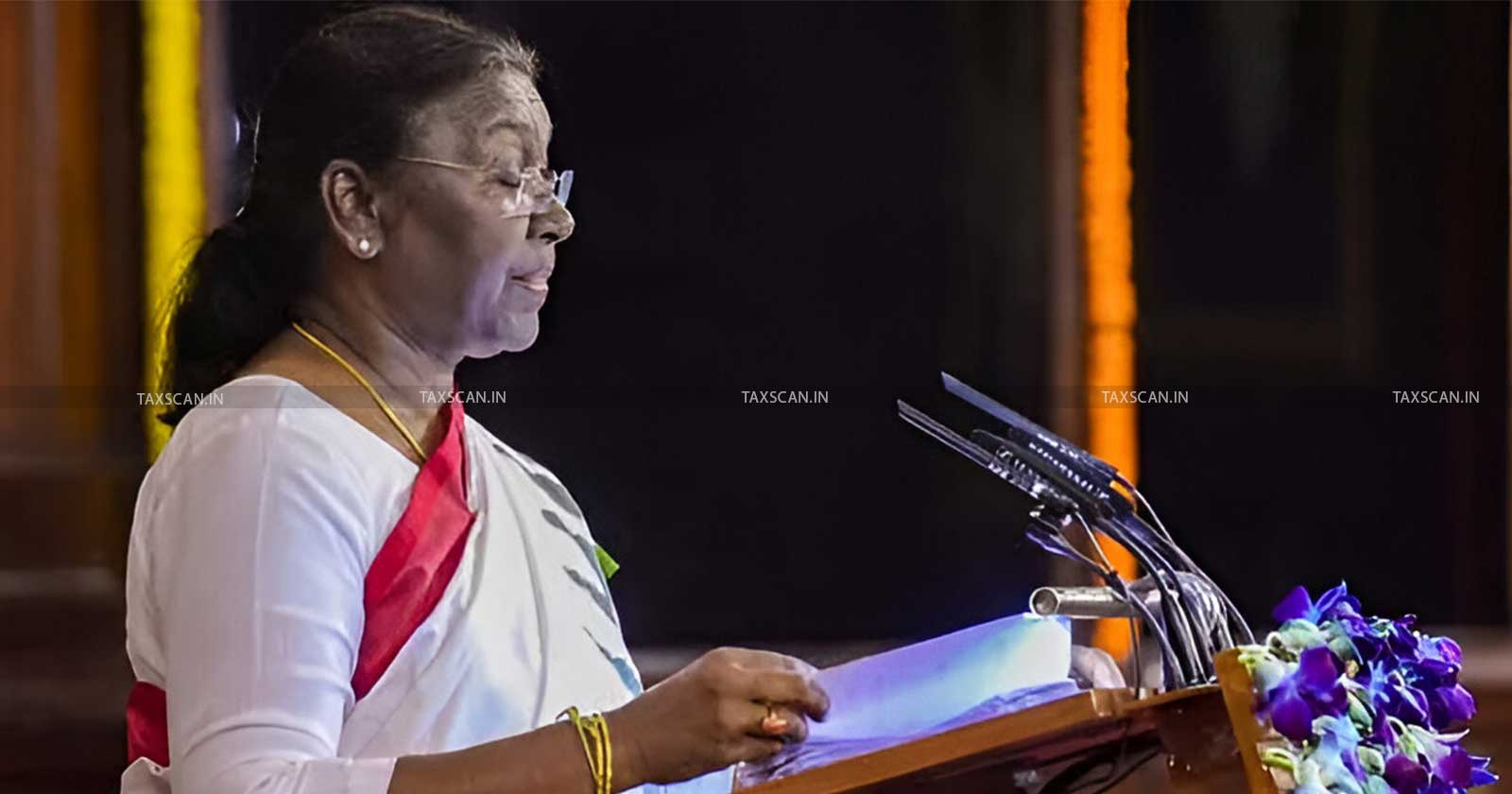Economic & Financial Aspects of President Droupadi Murmu’s Speech at Parliament Joint Session
Key Economic and Financial Takeaways from the Pre-Economic Survey Speech

Economic Survey 2024-2025 – President Droupadi Murmu – Finance Minister Nirmala Sitharaman – taxscan
Economic Survey 2024-2025 – President Droupadi Murmu – Finance Minister Nirmala Sitharaman – taxscan
In her pre-budget address to the joint session of Parliament prior to tabling of the Economic Survey 2024-2025 by the Finance Minister Nirmala Sitharaman, President Droupadi Murmu outlined the government’s unwavering commitment to revitalizing India’s economy, emphasizing resilience, innovation, and inclusivity.
Against the backdrop of global challenges such as the COVID-19 pandemic, geopolitical tensions, and economic uncertainties, India has emerged as a beacon of stability and growth. The President highlighted key economic and financial initiatives that have strengthened the nation’s economic foundation and positioned it as a global leader in innovation and digital transformation.
President Murmu began by acknowledging the government’s determined efforts to lift the economy out of a state of policy paralysis. She credited the introduction of the Goods and Services Tax (GST) under the principle of ‘One Nation, One Tax’ as a transformative reform that has streamlined taxation, boosted revenue, and benefited all states. The GST regime, she noted, has played a pivotal role in formalizing the economy and enhancing ease of doing business.
Get a Copy of Direct Taxes Law and Practices Including Tax Planning with Free E-Book Access, Click Here
The President also underscored the success of the ‘Make in India’ initiative, which has attracted global investments and positioned India as a manufacturing hub. Today, major international brands proudly display the ‘Made in India’ label, reflecting the country’s growing industrial capabilities and self-reliance.
Recognizing the critical role of small traders and entrepreneurs in driving economic progress, President Murmu emphasized the government’s focus on empowering this sector. She highlighted the Credit Guarantee Scheme for Micro, Small, and Medium Enterprises (MSMEs) and the establishment of e-commerce export hubs as key measures to promote entrepreneurship and job creation.
The President announced a significant increase in the loan limit under the Mudra scheme, from ₹10 lakh to ₹20 lakh, benefiting millions of small entrepreneurs. This move is expected to provide a much-needed boost to self-employment and economic activity at the grassroots level.
Get a Copy of Direct Taxes Law and Practices Including Tax Planning with Free E-Book Access, Click Here
President Murmu also lauded the government’s efforts to democratize financial services, making loans, credit cards, and insurance accessible to all. She highlighted the PM SVANidhi Yojana, which has brought street vendors into the formal banking system, enabling them to access additional loans based on their digital transaction records. This initiative has not only empowered marginalized communities but also fostered a culture of digital payments.
The Open Network for Digital Commerce (ONDC) was another milestone highlighted by the President. By creating an inclusive digital commerce ecosystem, the ONDC initiative has leveled the playing field for small businesses, allowing them to compete effectively in the online marketplace.
President Murmu described India’s digital revolution as a golden chapter in the nation’s progress. With the launch of 5G services, India has joined the ranks of global leaders in digital technology. The Unified Payments Interface (UPI) has been a game-changer, with over 50% of the world’s real-time digital transactions now taking place in India. This achievement has not only enhanced financial inclusion but also positioned India as a global leader in digital innovation.
Get a Copy of Direct Taxes Law and Practices Including Tax Planning with Free E-Book Access, Click Here
The President emphasized the role of digital technology as a tool for social justice and equality. Today, even the smallest shopkeepers and rural citizens benefit from digital payments and banking services. Over the past decade, more than 5 lakh Common Service Centres have been established, providing citizens with access to dozens of government services online.
To minimize government interference in people’s lives, the government has prioritized e-governance. Initiatives like DigiLocker have enabled citizens to access and share important documents seamlessly, reducing bureaucratic hurdles. However, the President also acknowledged the growing challenges of cybersecurity in an increasingly digital society. She highlighted the government’s efforts to combat digital fraud, cybercrime, and emerging threats like deep fakes, which pose risks to social, economic, and national security.
India’s achievement of Tier-1 status in the Global Cybersecurity Index reflects the government’s commitment to ensuring competence in this critical field. The President also noted the creation of employment opportunities in cybersecurity, empowering the youth to contribute to the nation’s digital resilience.
Get a Copy of Direct Taxes Law and Practices Including Tax Planning with Free E-Book Access, Click Here
President Droupadi Murmu’s pre-budget speech painted a picture of an economy on the rise, driven by innovation, inclusivity, and resilience. From empowering MSMEs and small entrepreneurs to leading the global digital revolution, the government’s initiatives have laid a strong foundation for sustainable growth. As India navigates the complexities of a rapidly changing world, the President’s address underscored the nation’s readiness to embrace challenges and seize opportunities, ensuring a brighter future for all citizens.
Support our journalism by subscribing to Taxscan premium. Follow us on Telegram for quick updates


